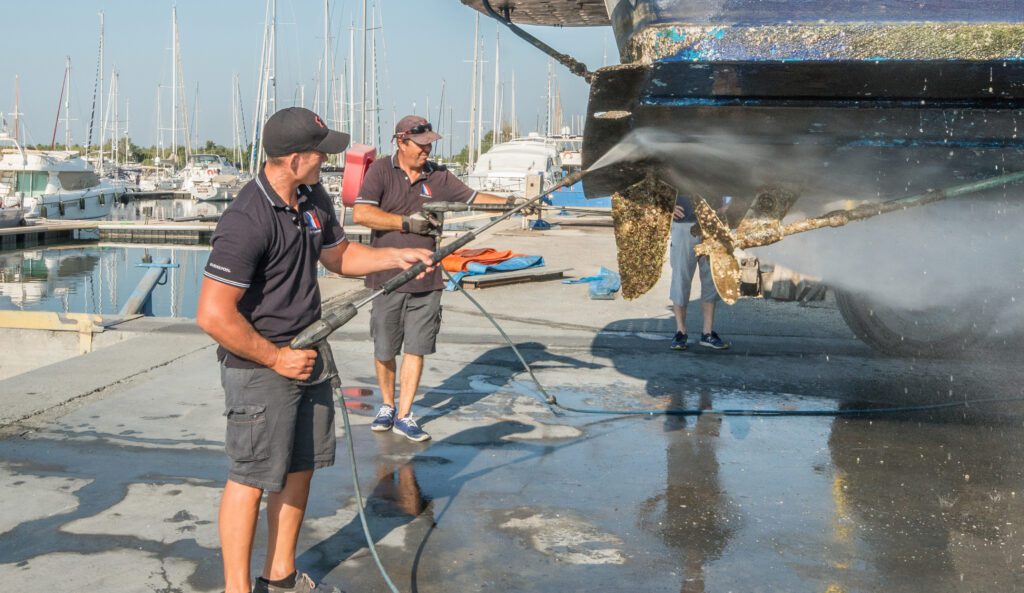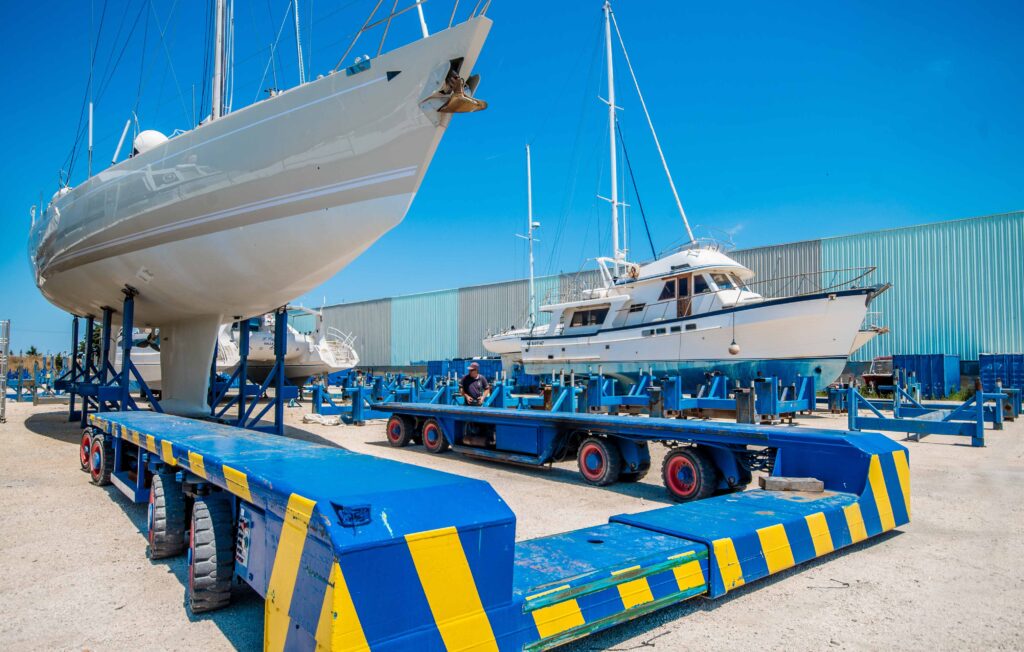Publication date: 04/04/2024
Comparison of boat parking in dry and afloat ports
Often, differences in accessibility and price
First, there's the question of the demand for a berth, which can be decisive. Depending on the sailing region and the time it takes to obtain a berth, the choice can be made quickly! You may have to wait several decades to be allocated a berth when a dry ber th is already available close to home. Mooring and storage prices can also vary widely, depending on capacity and conditions.
The question of rapid access to water
With a boat afloat, owners can often say they're "ready to go". Particularly in full-water ports, where boats never land! But that's not always the case: some ports require you to pass through a lock or a sluice at specific times to reach the sea. This generally means that the yachtsman has to adapt his navigation to ensure that he can enter and leave the marina at the times in question...
The situation needs to be studied: sometimes dry storage is much less restrictive!
Unequal risks for dry and afloat port sites
It's important to bear in mind that storing a boat afloat presents a number of risks.
First of all, there's always the risk of water ingress, due to a bilge pump malfunction or a more serious problem. We don't always think about it, but a boat stored afloat is also a boat exposed to collisions: with a boat moored in the water in a marina, there's always the risk of it being hit by a neighboring boat, whose captain hasn't managed the maneuver... In some harbors, certain locations may be less easy for some sailors to apprehend. Finally, if the marina is not properly secured and supervised, it can also happen that the unit, easily accessible via the pontoons, is visited.
There's no need for all these risks when storing a boat on dry land!
Dry boat storage: a maintenance advantage
There's also a big difference between dry and afloat storage for your boat, when it comes to maintenance work. The hull of a motorboat or sailboat stored in a marina afloat, which always remains in the water, will, for example, require much more work when it comes to careening.
While afloat, the hull is inevitably damaged by algae and shellfish. In some regions, the deck can become moss-laden. Gelcoat, glazing and upholstery, too, can suffer the long-term effects of the sun's rays...
The great advantage of parking your boat in the dry is that you can protect it from the premature wear and tear often caused by the weather. A boat parked out of the water, protected from sun and rain, pollution, sand or dust, is guaranteed to last longer. As well as ensuring an aesthetically pleasing unit, it's a question of ensuring a boat in good working order!
With a unit in and out of the water before and after every sail, it's also easier to carry out regular checks. As a result, boaters canquickly identify any problems that may arise below the waterline, unlike those who only take their boat out for annual maintenance once a year.

📚 Also read: He recounts his experience in the Mediterranean dry port of Leucate
Questions to ask before placing your boat in a dry port
If you're thinking of storing your boat out of the water, the ease of access to your unit will have to match your plans. Take a close look at the lifting equipment available at the various dry ports you are considering, as well as the characteristics of your boat: putting a boat on cradles, in particular, requires a thorough knowledge of the dimensions of your unit!
Are the marina's facilities and pitches suitable for your unit? Do the various marinas offer on-site maintenance and repair services?
So, to get the most out of your unit in a dry port, find out exactly how you can launch and retrieve it. Once the boat is on racks, can it be handled every day of the week, and every day of the year? Do I need to request a move in advance? If so, how far in advance?
Solutions for parking your boat on dry land
If you're looking to park a boat in a dry port, the Port Adhoc group has just what you need: in the English Channel, on the Atlantic coast or in the Mediterranean, the 5 French dry ports in the Port Adhoc network are ready to welcome you all year round.
Port Adhoc Paimpol, our dry port in Brittany
On the North Brittany coast, in the English Channel, the dry port of Paimpol offers 240 storage spaces for yachtsmen. Boats are stored on racks in the dry. Owners can ask for their boats to be put in the water every day, without an appointment, for 6 hours before and after high tide. Compared with neighboring ports, Port Adhoc Paimpol offers the convenience of not having to pass through a lock, so you can make the most of your sailing time.
Port Adhoc Soubise, our out-of-water port in Charente-Maritime
In southwest France, the port of Soubise can also accommodate 240 boats. When in dry storage, they are parked on racks or on cradles - depending on the unit concerned and the owner's choice.
The port is particularly well-equipped to handle large vessels: thanks to a forklift truck, a Manuscopic and, above all, a 20-ton Parklev, crews can handle boats up to 53 feet long. The Soubise dry dock is a favorite with motorboat and sailboat owners, thanks to its strategic location just 5 miles from the Atlantic Ocean.
Port Adhoc Bayonne-Anglet, our dry marina in the Basque Country
Further south, the Port Adhoc group also manages a dry port in the Basque Country! Here, owners still have a choice when it comes to parking their boats: on one of the 210 spaces available on racks, or on one of the 30 spaces on cradles. Port Adhoc Bayonne-Anglet is the ideal dry port for those considering river navigation - in the Pyrénées-Atlantiques region, or sea navigation - on the coasts of the Atlantic Ocean or the Bay of Biscay.
Port Adhoc Leucate, our dry boat storage solution in Occitania
The port of Leucate is the perfect option for sailing enthusiasts on the Grande Bleue: the dry dock has 300 berths for launches up to 9 meters long. At Port Adhoc Leucate, boats are stored on racks, just a stone's throw from some fantastic Mediterranean destinations. Depending on the type of boat, the nearby Etang de Leucate also offers a change of sailing environment.
Port Napoléonour dry and afloat port near Marseille
The other Mediterranean dry port in our network, Port Napoléon is the solution for all boaters wishing to park their boats near Marseille. It takes only 26 miles of sailing to reach the city of Marseille from the Port-Saint-Louis-du-Rhône mar ina! Boat owners looking for a dry berth are often surprised by the wide range of services offered on site, within the port itself...
📚 Also read: 18 beautiful French ports of call to discover from Port Napoléon
Do you still have questions, or do you think you've found the dry dock space you need in one of the ports in our network?
If you'd like to be accompanied by a Port Adhoc agent to study your situation and make the wisest choice, we'll be happy to help!
